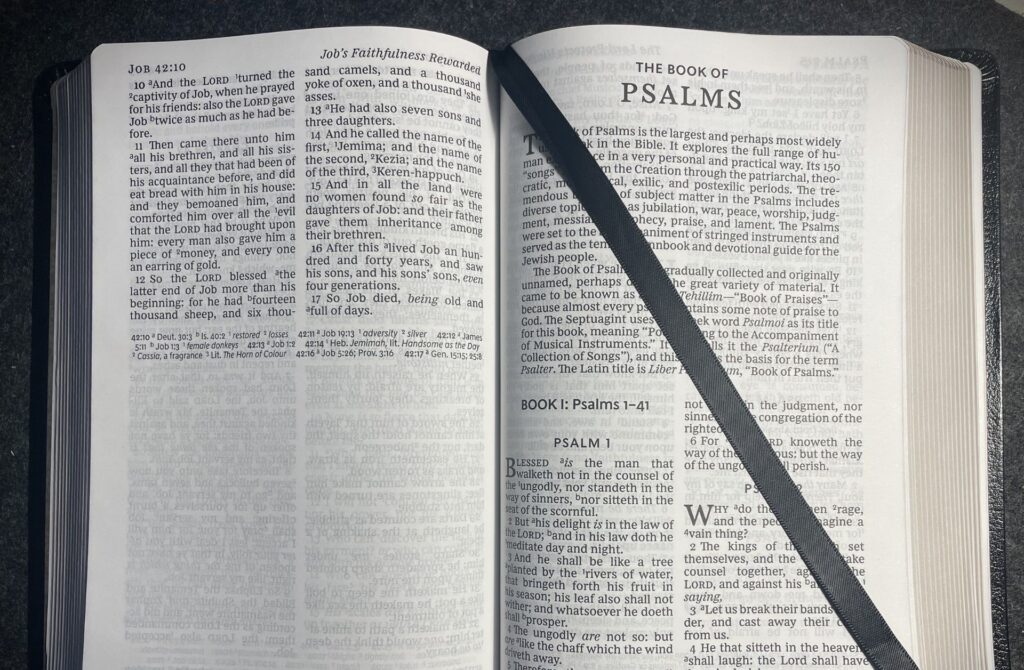Summary of The Book of Psalms

What are The 5 Books of Psalms
Summary of The Book of Psalms. The Book of Psalms, often referred to simply as the Psalms, is a collection of sacred songs, prayers, and poems that is part of the Old Testament in the Bible. It is one of the most widely read and cherished books of Scripture across Judaism and Christianity.
King David is credited with writing many of the psalms (e.g., Psalms 23, 51). However, others are attributed to figures like Asaph, the sons of Korah, Moses, Solomon, or are considered anonymous.
The Psalms are beloved for their emotional depth and universality, offering comfort, inspiration, and a way to express a wide range of human emotions to God.
In Judaism: Psalms are integral to daily prayers, special holidays, and personal devotion.
In Christianity: They are often read in church services, used for personal meditation, and sung in hymns or chants.

The Book of Psalms contains 150 chapters, each of which is considered an individual psalm. The chapters vary in length, with Psalm 117 being the shortest (only two verses) and Psalm 119 being the longest (176 verses).
The Psalms are divided into five sections, or “books,” which some scholars suggest reflect the five books of the Torah (Genesis through Deuteronomy). These sections are:
Psalms 1–41
Psalms 42–72
Psalms 73–89
Psalms 90–106
Psalms 107–150

The Psalms serve various purposes.
- Worship and Praise: Many psalms celebrate God’s majesty, power, and goodness (e.g., Psalms 8, 19, 100).
- Lamentation and Sorrow: Some express anguish, seeking God’s help during times of distress (e.g., Psalms 22, 42, 130).
- Thanksgiving: Others express gratitude for God’s blessings (e.g., Psalms 23, 136).
- Wisdom and Instruction: Some focus on moral teachings and life guidance (e.g., Psalm 1, 119).
- Royal Psalms: These discuss the kingship of God or earthly kings (e.g., Psalms 2, 45, 110).
What Are The 5 Books of Psalms
The 5 Books of Psalms
- Book 1 – The key theme of Psalms 1–41 is the contrast between the righteous, who trust in God and delight in His law, and the wicked, who face destruction. This section emphasizes God’s faithfulness, justice, and mercy, inviting believers to rely on Him for guidance, protection, and forgiveness.
- Book 2 – The key theme of Psalms 42–72 is a deep longing for God’s presence and deliverance, reflecting trust in Him even amid distress and uncertainty. This section highlights God’s sovereignty, the hope of restoration, and the role of the king as His anointed servant, pointing toward justice and salvation.
- Book 3 – The key theme of Psalms 73–89 is the tension between faith in God’s promises and the reality of suffering, injustice, and national crisis. This section wrestles with questions of God’s faithfulness while reaffirming hope in His ultimate justice and covenantal love.
- Book 4 – The key theme of Psalms 90–106 is the eternal sovereignty of God and humanity’s dependence on His mercy and steadfast love. This section emphasizes God as Creator and King, calling His people to worship, trust in His justice, and find hope in His enduring faithfulness.
- Book 5 – The key theme of Psalms 107–150 is a crescendo of praise and thanksgiving for God’s faithfulness, deliverance, and sovereignty over all creation. This section celebrates His redemptive works, invites all people to worship Him, and concludes with a grand doxology in Psalm 150, urging everything that has breath to praise the Lord.
For a deeper dive into each of the five books in Psalms, click here as I discuss further, beginning with Psalms Book 1 . Or if you want to start the Bible Studies offered here, begin with the Book of Matthew in the New Testament.
You must be logged in to post a comment.